Commander Synergies
Discover cards that synergize perfectly with your Commander.
Synergy
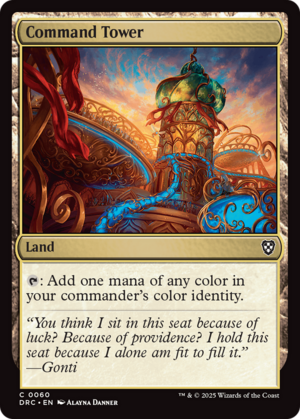
Card Details
Info
| Color: | |
| Identifies: | |
| Cost: | |
| Rarity: | Common |
| Converted Cost: | 0 |
| Power/Toughness: | / |
| Types: | |
| SubTypes: | |
| Languages: | 
          |
| Layout: | Normal |
| Rank: | |
| Saltiness: |
Rules
Text
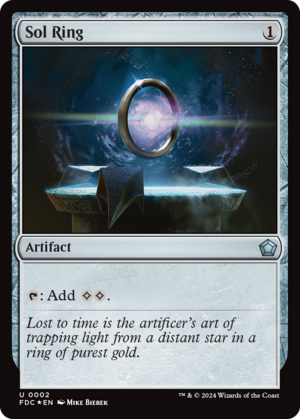
Card Details
Info
| Color: | |
| Identifies: | |
| Cost: |
|
| Rarity: | Uncommon |
| Converted Cost: | 1 |
| Power/Toughness: | / |
| Types: | |
| SubTypes: | |
| Languages: | 
         |
| Layout: | Normal |
| Rank: | |
| Saltiness: |
Rules
Text
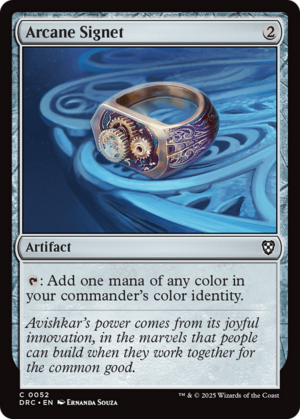
Card Details
Info
| Color: | |
| Identifies: | |
| Cost: |
|
| Rarity: | Common |
| Converted Cost: | 2 |
| Power/Toughness: | / |
| Types: | |
| SubTypes: | |
| Languages: | 
          |
| Layout: | Normal |
| Rank: | |
| Saltiness: |
Rules
Text
Less Synergy
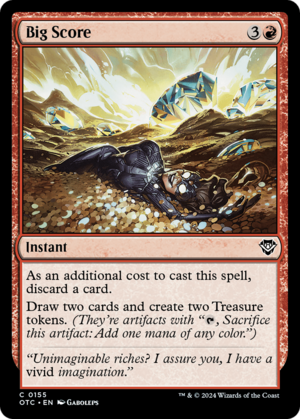
Card Details
Info
| Color: | |
| Identifies: | |
| Cost: |
|
| Rarity: | Common |
| Converted Cost: | 4 |
| Power/Toughness: | / |
| Types: | |
| SubTypes: | |
| Languages: | 
          |
| Layout: | Normal |
| Rank: | |
| Saltiness: | |
| Tokens: |
Abilities/Keywords
Rules
Text
As an additional cost to cast this spell,discarda card. Draw two cards and create two Treasure tokens. (They're artifacts with "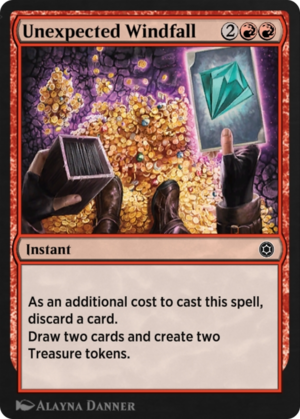
Card Details
Info
| Color: | |
| Identifies: | |
| Cost: |
|
| Rarity: | Common |
| Converted Cost: | 4 |
| Power/Toughness: | / |
| Types: | |
| SubTypes: | |
| Languages: | 
          |
| Layout: | Normal |
| Rank: | |
| Saltiness: | |
| Tokens: |
Abilities/Keywords
Rules
Prices
| Seller | Price |
|---|
Legalities
Standard
Standardbrawl
Vintage
Modern
Brawl
Historic
Duel
Alchemy
Predh
Oathbreaker
Commander
Pioneer
Oldschool
Timeless
Premodern
Penny
Pauper
Gladiator
Paupercommander
Future
Legacy
Text
As an additional cost to cast this spell,discarda card. Draw two cards and create two Treasure tokens. (They're artifacts with "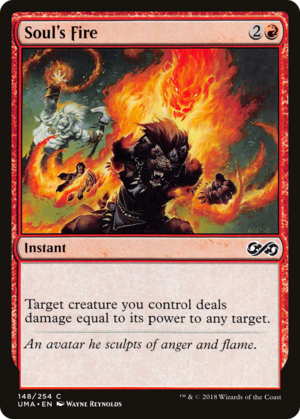
Card Details
Info
| Color: | |
| Identifies: | |
| Cost: |
|
| Rarity: | Common |
| Converted Cost: | 3 |
| Power/Toughness: | / |
| Types: | |
| SubTypes: | |
| Languages: | 
         |
| Layout: | Normal |
| Rank: | |
| Saltiness: |
Rules
Prices
Legalities
Standard
Standardbrawl
Vintage
Modern
Brawl
Historic
Duel
Alchemy
Predh
Oathbreaker
Commander
Pioneer
Oldschool
Timeless
Premodern
Penny
Pauper
Gladiator
Paupercommander
Future
Legacy
Text
Target creature you control deals damage equal to its power to any target.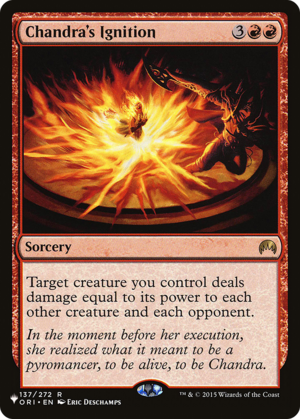
Card Details
Info
| Color: | |
| Identifies: | |
| Cost: |
|
| Rarity: | Rare |
| Converted Cost: | 5 |
| Power/Toughness: | / |
| Types: | |
| SubTypes: | |
| Languages: | 
          |
| Layout: | Normal |
| Rank: | |
| Saltiness: |
Rules
Text
Target creature you control deals damage equal to its power to each other creature and each opponent.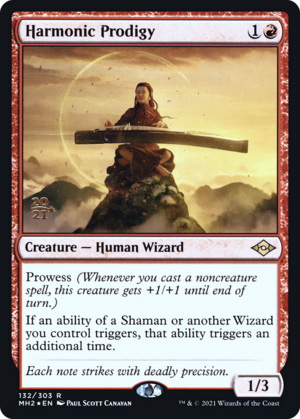
Card Details
Info
| Color: | |
| Identifies: | |
| Cost: |
|
| Rarity: | Rare |
| Converted Cost: | 2 |
| Power/Toughness: | 1/3 |
| Types: | |
| SubTypes: | |
| Languages: | 
          |
| Layout: | Normal |
| Rank: | |
| Saltiness: |
Abilities/Keywords
Rules
Text
Prowess (Whenever you cast a noncreature spell, this creature gets +1/+1 until end of turn.) If an ability of a Shaman or another Wizard you control triggers, that ability triggers an additional time.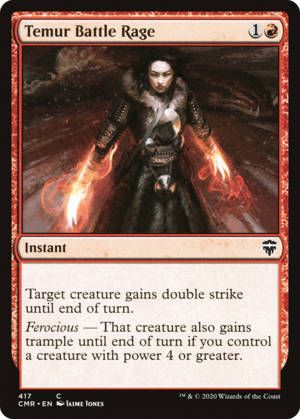
Card Details
Info
| Color: | |
| Identifies: | |
| Cost: |
|
| Rarity: | Common |
| Converted Cost: | 2 |
| Power/Toughness: | / |
| Types: | |
| SubTypes: | |
| Languages: | 
          |
| Layout: | Normal |
| Rank: | |
| Saltiness: |
Abilities/Keywords
Rules
Prices
Legalities
Standard
Standardbrawl
Vintage
Modern
Brawl
Historic
Duel
Alchemy
Predh
Oathbreaker
Commander
Pioneer
Oldschool
Timeless
Premodern
Penny
Pauper
Gladiator
Paupercommander
Future
Legacy
Text
Target creature gains double strike until end of turn. Ferocious — That creature also gains trample until end of turn if you control a creature with power 4 or greater.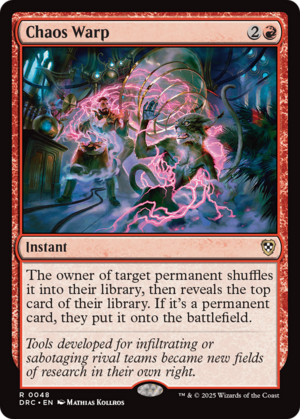
Card Details
Info
| Color: | |
| Identifies: | |
| Cost: |
|
| Rarity: | Rare |
| Converted Cost: | 3 |
| Power/Toughness: | / |
| Types: | |
| SubTypes: | |
| Languages: | 
         |
| Layout: | Normal |
| Rank: | |
| Saltiness: |
Rules
Text
The owner of target permanent shuffles it into their library, then reveals the top card of their library. If it's a permanent card, they put it onto the battlefield.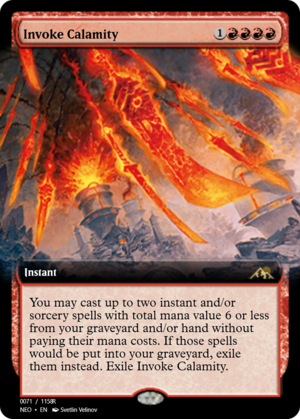
Card Details
Info
| Color: | |
| Identifies: | |
| Cost: |
|
| Rarity: | Rare |
| Converted Cost: | 5 |
| Power/Toughness: | / |
| Types: | |
| SubTypes: | |
| Languages: | 
          |
| Layout: | Normal |
| Rank: | |
| Saltiness: |
Rules
Prices
| Seller | Price |
|---|
Legalities
Standard
Standardbrawl
Vintage
Modern
Brawl
Historic
Duel
Alchemy
Predh
Oathbreaker
Commander
Pioneer
Oldschool
Timeless
Premodern
Penny
Pauper
Gladiator
Paupercommander
Future
Legacy
Text
You may cast up to two instant and/or sorcery spells with total mana value 6 or less from your graveyard and/or hand without paying their mana costs. If those spells would be put into your graveyard, exile them instead. Exile Invoke Calamity.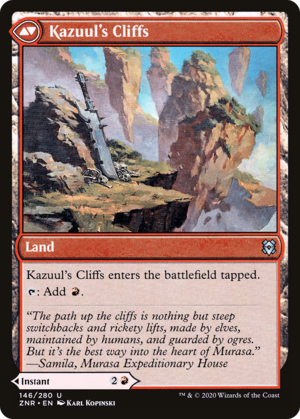
Card Details
- Card Faces:
- Kazuul's Fury (Front)
- Kazuul's Cliffs (Back)
Info
| Color: | |
| Identifies: | |
| Cost: |
|
| Rarity: | Uncommon |
| Converted Cost: | 3 |
| Power/Toughness: | / |
| Types: | |
| SubTypes: | |
| Languages: | 
          |
| Layout: | Modal Dfc |
| Rank: | |
| Saltiness: |
Rules
Prices
Legalities
Standard
Standardbrawl
Vintage
Modern
Brawl
Historic
Duel
Alchemy
Predh
Oathbreaker
Commander
Pioneer
Oldschool
Timeless
Premodern
Penny
Pauper
Gladiator
Paupercommander
Future
Legacy
Text
As an additional cost to cast this spell,sacrificea creature. Kazuul's Fury deals damage equal to the sacrificed creature's power to any target.Info
| Color: | |
| Identifies: | |
| Cost: | |
| Rarity: | Uncommon |
| Converted Cost: | 0 |
| Power/Toughness: | / |
| Types: | |
| SubTypes: | |
| Languages: | 
          |
| Layout: | Modal Dfc |
| Rank: | |
| Saltiness: |
Rules
Prices
Legalities
Standard
Standardbrawl
Vintage
Modern
Brawl
Historic
Duel
Alchemy
Predh
Oathbreaker
Commander
Pioneer
Oldschool
Timeless
Premodern
Penny
Pauper
Gladiator
Paupercommander
Future
Legacy
Text
This land enters tapped.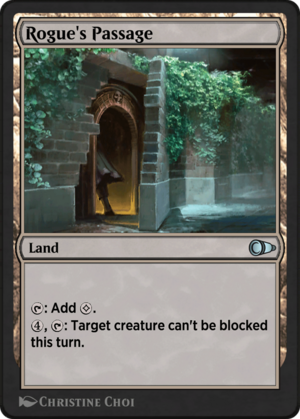
Card Details
Info
| Color: | |
| Identifies: | |
| Cost: | |
| Rarity: | Uncommon |
| Converted Cost: | 0 |
| Power/Toughness: | / |
| Types: | |
| SubTypes: | |
| Languages: | 
          |
| Layout: | Normal |
| Rank: | |
| Saltiness: |
Rules
Prices
| Seller | Price |
|---|
Legalities
Standard
Standardbrawl
Vintage
Modern
Brawl
Historic
Duel
Alchemy
Predh
Oathbreaker
Commander
Pioneer
Oldschool
Timeless
Premodern
Penny
Pauper
Gladiator
Paupercommander
Future
Legacy
Text
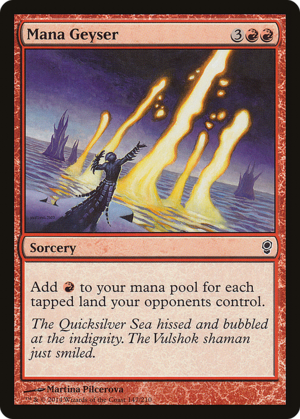
Card Details
Info
| Color: | |
| Identifies: | |
| Cost: |
|
| Rarity: | Common |
| Converted Cost: | 5 |
| Power/Toughness: | / |
| Types: | |
| SubTypes: | |
| Languages: | 
         |
| Layout: | Normal |
| Rank: | |
| Saltiness: |
Rules
Prices
Legalities
Standard
Standardbrawl
Vintage
Modern
Brawl
Historic
Duel
Alchemy
Predh
Oathbreaker
Commander
Pioneer
Oldschool
Timeless
Premodern
Penny
Pauper
Gladiator
Paupercommander
Future
Legacy
Text
Add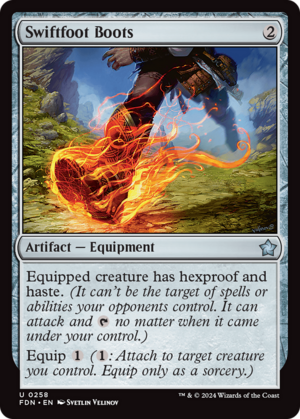
Card Details
Info
| Color: | |
| Identifies: | |
| Cost: |
|
| Rarity: | Uncommon |
| Converted Cost: | 2 |
| Power/Toughness: | / |
| Types: | |
| SubTypes: | |
| Languages: | 
          |
| Layout: | Normal |
| Rank: | |
| Saltiness: |
Abilities/Keywords
Rules
Prices
Legalities
Standard
Standardbrawl
Vintage
Modern
Brawl
Historic
Duel
Alchemy
Predh
Oathbreaker
Commander
Pioneer
Oldschool
Timeless
Premodern
Penny
Pauper
Gladiator
Paupercommander
Future
Legacy
Text
Equipped creature has hexproof and haste. (It can't be the target of spells or abilities your opponents control. It can attack and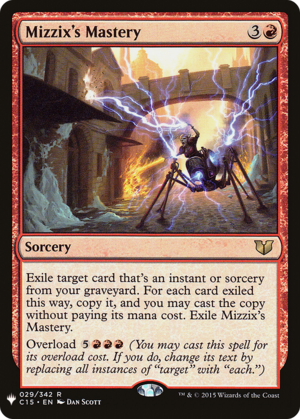
Card Details
Info
| Color: | |
| Identifies: | |
| Cost: |
|
| Rarity: | Rare |
| Converted Cost: | 4 |
| Power/Toughness: | / |
| Types: | |
| SubTypes: | |
| Languages: | 
       |
| Layout: | Normal |
| Rank: | |
| Saltiness: |
Abilities/Keywords
Rules
Text
Exile target card that's an instant or sorcery from your graveyard. For each card exiled this way, copy it, and you may cast the copy without paying its mana cost. Exile Mizzix's Mastery. Overload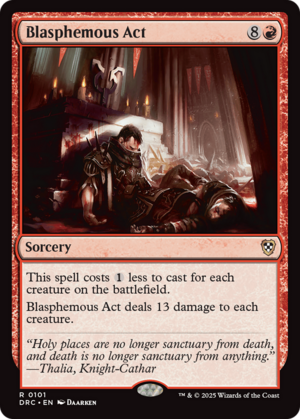
Card Details
Info
| Color: | |
| Identifies: | |
| Cost: |
|
| Rarity: | Rare |
| Converted Cost: | 9 |
| Power/Toughness: | / |
| Types: | |
| SubTypes: | |
| Languages: | 
          |
| Layout: | Normal |
| Rank: | |
| Saltiness: |
Rules
Text
This spell costs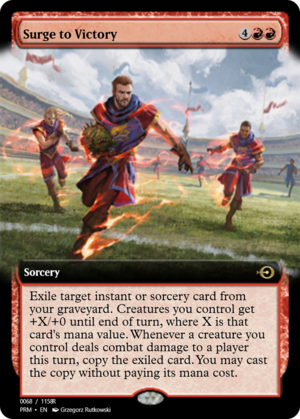
Card Details
Info
| Color: | |
| Identifies: | |
| Cost: |
|
| Rarity: | Rare |
| Converted Cost: | 6 |
| Power/Toughness: | / |
| Types: | |
| SubTypes: | |
| Languages: | 
     |
| Layout: | Normal |
| Rank: | |
| Saltiness: |
Rules
Prices
| Seller | Price |
|---|
Legalities
Standard
Standardbrawl
Vintage
Modern
Brawl
Historic
Duel
Alchemy
Predh
Oathbreaker
Commander
Pioneer
Oldschool
Timeless
Premodern
Penny
Pauper
Gladiator
Paupercommander
Future
Legacy
Text
Exile target instant or sorcery card from your graveyard. Creatures you control get +X/+0 until end of turn, where X is that card's mana value. Whenever a creature you control deals combat damage to a player this turn, copy the exiled card. You may cast the copy without paying its mana cost.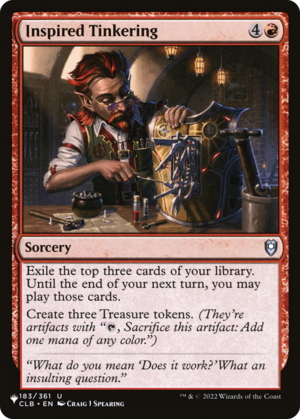
Card Details
Info
| Color: | |
| Identifies: | |
| Cost: |
|
| Rarity: | Uncommon |
| Converted Cost: | 5 |
| Power/Toughness: | / |
| Types: | |
| SubTypes: | |
| Languages: | 
          |
| Layout: | Normal |
| Rank: | |
| Saltiness: | |
| Tokens: |
Abilities/Keywords
Rules
Text
Exile the top three cards of your library. Until the end of your next turn, you may play those cards. Create three Treasure tokens. (They're artifacts with "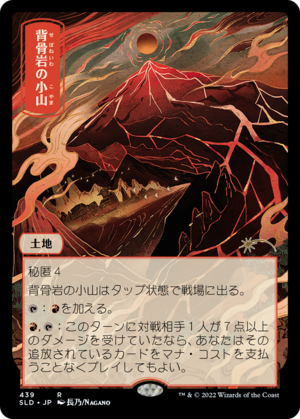
Card Details
Info
| Color: | |
| Identifies: | |
| Cost: | |
| Rarity: | Rare |
| Converted Cost: | 0 |
| Power/Toughness: | / |
| Types: | |
| SubTypes: | |
| Languages: | 
         |
| Layout: | Normal |
| Rank: | |
| Saltiness: |
Abilities/Keywords
Rules
Prices
Legalities
Standard
Standardbrawl
Vintage
Modern
Brawl
Historic
Duel
Alchemy
Predh
Oathbreaker
Commander
Pioneer
Oldschool
Timeless
Premodern
Penny
Pauper
Gladiator
Paupercommander
Future
Legacy
Text
Hideaway 4 (When this land enters, look at the top four cards of your library, exile one face down, then put the rest on the bottom in a random order.) This land enters tapped.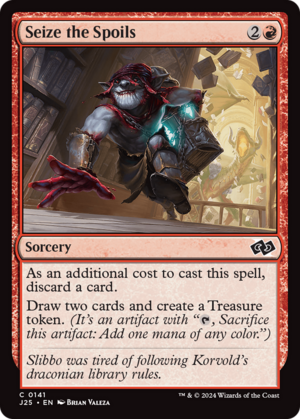
Card Details
Info
| Color: | |
| Identifies: | |
| Cost: |
|
| Rarity: | Common |
| Converted Cost: | 3 |
| Power/Toughness: | / |
| Types: | |
| SubTypes: | |
| Languages: | 
          |
| Layout: | Normal |
| Rank: | |
| Saltiness: | |
| Tokens: |
Abilities/Keywords
Rules
Text
As an additional cost to cast this spell,discarda card. Draw two cards and create a Treasure token. (It's an artifact with "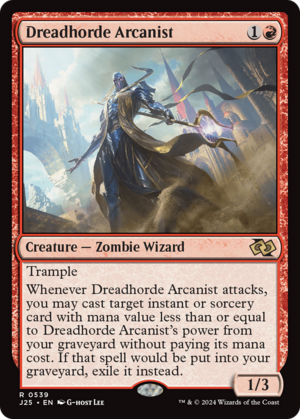
Card Details
Info
| Color: | |
| Identifies: | |
| Cost: |
|
| Rarity: | Rare |
| Converted Cost: | 2 |
| Power/Toughness: | 1/3 |
| Types: | |
| SubTypes: | |
| Languages: | 
          |
| Layout: | Normal |
| Rank: | |
| Saltiness: |
Abilities/Keywords
Rules
Text
Trample Whenever this creature attacks, you may cast target instant or sorcery card with mana value less than or equal to this creature's power from your graveyard without paying its mana cost. If that spell would be put into your graveyard, exile it instead.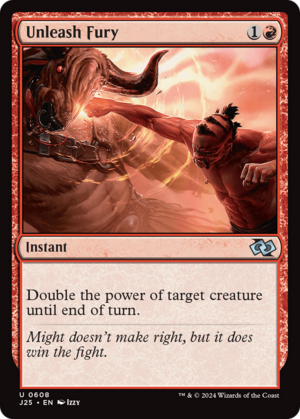
Card Details
Info
| Color: | |
| Identifies: | |
| Cost: |
|
| Rarity: | Uncommon |
| Converted Cost: | 2 |
| Power/Toughness: | / |
| Types: | |
| SubTypes: | |
| Languages: | 
          |
| Layout: | Normal |
| Rank: | |
| Saltiness: |
Rules
Text
Double the power of target creature until end of turn.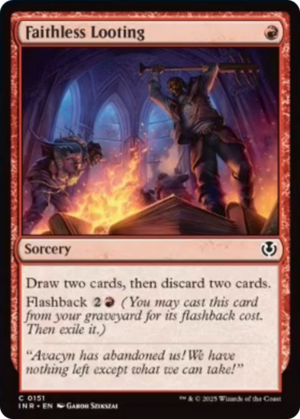
Card Details
Info
| Color: | |
| Identifies: | |
| Cost: |
|
| Rarity: | Common |
| Converted Cost: | 1 |
| Power/Toughness: | / |
| Types: | |
| SubTypes: | |
| Languages: | 
          |
| Layout: | Normal |
| Rank: | |
| Saltiness: |
Abilities/Keywords
Rules
Prices
Legalities
Standard
Standardbrawl
Vintage
Modern
Brawl
Historic
Duel
Alchemy
Predh
Oathbreaker
Commander
Pioneer
Oldschool
Timeless
Premodern
Penny
Pauper
Gladiator
Paupercommander
Future
Legacy
Text
Draw two cards, thendiscardtwo cards. Flashback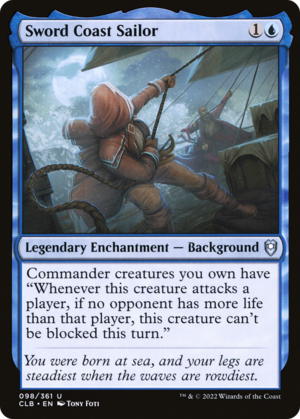
Card Details
Info
| Color: | |
| Identifies: | |
| Cost: |
|
| Rarity: | Uncommon |
| Converted Cost: | 2 |
| Power/Toughness: | / |
| Types: | |
| SubTypes: | |
| Languages: | 
          |
| Layout: | Normal |
| Rank: | |
| Saltiness: |
Rules
Prices
Legalities
Standard
Standardbrawl
Vintage
Modern
Brawl
Historic
Duel
Alchemy
Predh
Oathbreaker
Commander
Pioneer
Oldschool
Timeless
Premodern
Penny
Pauper
Gladiator
Paupercommander
Future
Legacy
Text
Commander creatures you own have "Whenever this creature attacks a player, if no opponent has more life than that player, this creature can't be blocked this turn."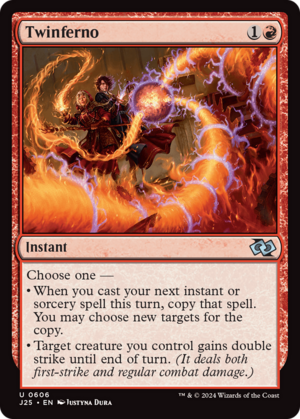
Card Details
Info
| Color: | |
| Identifies: | |
| Cost: |
|
| Rarity: | Uncommon |
| Converted Cost: | 2 |
| Power/Toughness: | / |
| Types: | |
| SubTypes: | |
| Languages: | 
       |
| Layout: | Normal |
| Rank: | |
| Saltiness: |
Rules
Text
Choose one — • When you cast your next instant or sorcery spell this turn, copy that spell. You may choose new targets for the copy. • Target creature you control gains double strike until end of turn. (It deals both first-strike and regular combat damage.)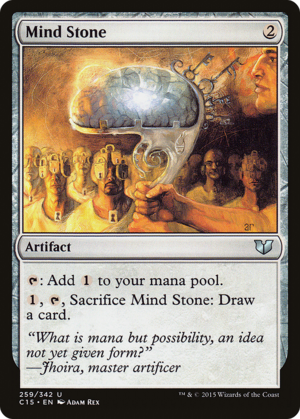
Card Details
Info
| Color: | |
| Identifies: | |
| Cost: |
|
| Rarity: | Uncommon |
| Converted Cost: | 2 |
| Power/Toughness: | / |
| Types: | |
| SubTypes: | |
| Languages: | 
          |
| Layout: | Normal |
| Rank: | |
| Saltiness: |
Rules
Prices
Legalities
Standard
Standardbrawl
Vintage
Modern
Brawl
Historic
Duel
Alchemy
Predh
Oathbreaker
Commander
Pioneer
Oldschool
Timeless
Premodern
Penny
Pauper
Gladiator
Paupercommander
Future
Legacy
Text
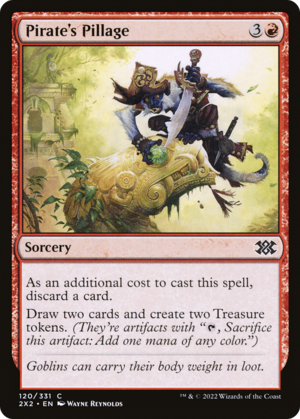
Card Details
Info
| Color: | |
| Identifies: | |
| Cost: |
|
| Rarity: | Common |
| Converted Cost: | 4 |
| Power/Toughness: | / |
| Types: | |
| SubTypes: | |
| Languages: | 
          |
| Layout: | Normal |
| Rank: | |
| Saltiness: | |
| Tokens: |
Abilities/Keywords
Rules
Prices
Legalities
Standard
Standardbrawl
Vintage
Modern
Brawl
Historic
Duel
Alchemy
Predh
Oathbreaker
Commander
Pioneer
Oldschool
Timeless
Premodern
Penny
Pauper
Gladiator
Paupercommander
Future
Legacy
Text
As an additional cost to cast this spell,discarda card. Draw two cards and create two Treasure tokens. (They're artifacts with "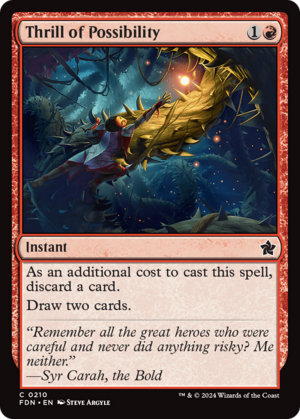
Card Details
Info
| Color: | |
| Identifies: | |
| Cost: |
|
| Rarity: | Common |
| Converted Cost: | 2 |
| Power/Toughness: | / |
| Types: | |
| SubTypes: | |
| Languages: | 
          |
| Layout: | Normal |
| Rank: | |
| Saltiness: |
Rules
Prices
Legalities
Standard
Standardbrawl
Vintage
Modern
Brawl
Historic
Duel
Alchemy
Predh
Oathbreaker
Commander
Pioneer
Oldschool
Timeless
Premodern
Penny
Pauper
Gladiator
Paupercommander
Future
Legacy
Text
As an additional cost to cast this spell,discarda card. Draw two cards.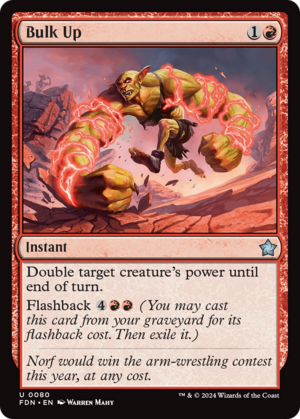
Card Details
Info
| Color: | |
| Identifies: | |
| Cost: |
|
| Rarity: | Uncommon |
| Converted Cost: | 2 |
| Power/Toughness: | / |
| Types: | |
| SubTypes: | |
| Languages: | 
     |
| Layout: | Normal |
| Rank: | |
| Saltiness: |
Abilities/Keywords
Rules
Prices
Legalities
Standard
Standardbrawl
Vintage
Modern
Brawl
Historic
Duel
Alchemy
Predh
Oathbreaker
Commander
Pioneer
Oldschool
Timeless
Premodern
Penny
Pauper
Gladiator
Paupercommander
Future
Legacy
Text
Double target creature's power until end of turn. Flashback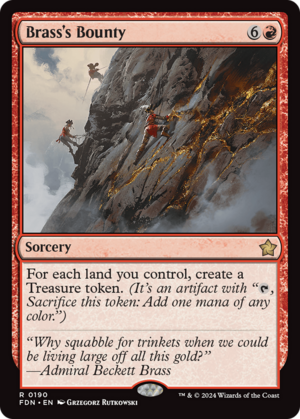
Card Details
Info
| Color: | |
| Identifies: | |
| Cost: |
|
| Rarity: | Rare |
| Converted Cost: | 7 |
| Power/Toughness: | / |
| Types: | |
| SubTypes: | |
| Languages: | 
          |
| Layout: | Normal |
| Rank: | |
| Saltiness: | |
| Tokens: |
Abilities/Keywords
Rules
Prices
Legalities
Standard
Standardbrawl
Vintage
Modern
Brawl
Historic
Duel
Alchemy
Predh
Oathbreaker
Commander
Pioneer
Oldschool
Timeless
Premodern
Penny
Pauper
Gladiator
Paupercommander
Future
Legacy
Text
For each land you control, create a Treasure token. (It's an artifact with "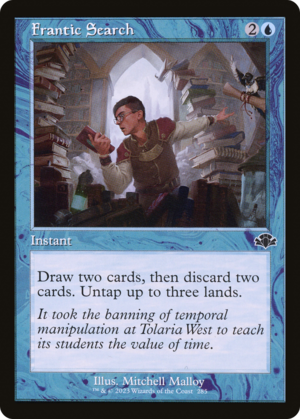
Card Details
Info
| Color: | |
| Identifies: | |
| Cost: |
|
| Rarity: | Common |
| Converted Cost: | 3 |
| Power/Toughness: | / |
| Types: | |
| SubTypes: | |
| Languages: | 
         |
| Layout: | Normal |
| Rank: | |
| Saltiness: |
Rules
Prices
Legalities
Standard
Standardbrawl
Vintage
Modern
Brawl
Historic
Duel
Alchemy
Predh
Oathbreaker
Commander
Pioneer
Oldschool
Timeless
Premodern
Penny
Pauper
Gladiator
Paupercommander
Future
Legacy
Text
Draw two cards, thendiscardtwo cards. Untap up to three lands.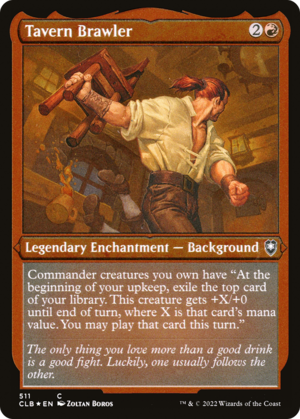
Card Details
Info
| Color: | |
| Identifies: | |
| Cost: |
|
| Rarity: | Common |
| Converted Cost: | 3 |
| Power/Toughness: | / |
| Types: | |
| SubTypes: | |
| Languages: | 
          |
| Layout: | Normal |
| Rank: | |
| Saltiness: |
Rules
Prices
Legalities
Standard
Standardbrawl
Vintage
Modern
Brawl
Historic
Duel
Alchemy
Predh
Oathbreaker
Commander
Pioneer
Oldschool
Timeless
Premodern
Penny
Pauper
Gladiator
Paupercommander
Future
Legacy
Text
Commander creatures you own have "At the beginning of your upkeep, exile the top card of your library. This creature gets +X/+0 until end of turn, where X is that card's mana value. You may play that card this turn."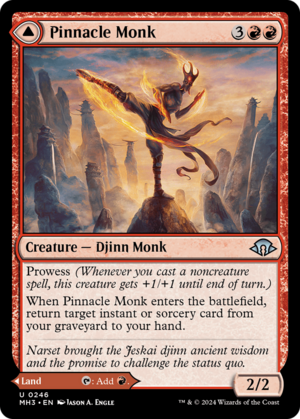
Card Details
- Card Faces:
- Pinnacle Monk (Front)
- Mystic Peak (Back)
Info
| Color: | |
| Identifies: | |
| Cost: |
|
| Rarity: | Uncommon |
| Converted Cost: | 5 |
| Power/Toughness: | 2/2 |
| Types: | |
| SubTypes: | |
| Languages: | 
       |
| Layout: | Modal Dfc |
| Rank: | |
| Saltiness: |
Abilities/Keywords
Rules
Prices
Legalities
Standard
Standardbrawl
Vintage
Modern
Brawl
Historic
Duel
Alchemy
Predh
Oathbreaker
Commander
Pioneer
Oldschool
Timeless
Premodern
Penny
Pauper
Gladiator
Paupercommander
Future
Legacy
Text
Prowess (Whenever you cast a noncreature spell, this creature gets +1/+1 until end of turn.) When this creature enters, return target instant or sorcery card from your graveyard to your hand.Info
| Color: | |
| Identifies: | |
| Cost: | |
| Rarity: | Uncommon |
| Converted Cost: | 0 |
| Power/Toughness: | / |
| Types: | |
| SubTypes: | |
| Languages: | 
       |
| Layout: | Modal Dfc |
| Rank: | |
| Saltiness: |
Abilities/Keywords
Rules
Prices
Legalities
Standard
Standardbrawl
Vintage
Modern
Brawl
Historic
Duel
Alchemy
Predh
Oathbreaker
Commander
Pioneer
Oldschool
Timeless
Premodern
Penny
Pauper
Gladiator
Paupercommander
Future
Legacy
Text
As this land enters, you may pay 3 life. If you don't, it enters tapped.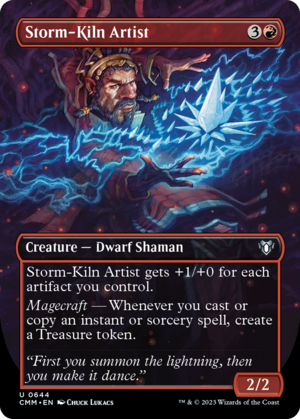
Card Details
Info
| Color: | |
| Identifies: | |
| Cost: |
|
| Rarity: | Uncommon |
| Converted Cost: | 4 |
| Power/Toughness: | 2/2 |
| Types: | |
| SubTypes: | |
| Languages: | 
          |
| Layout: | Normal |
| Rank: | |
| Saltiness: | |
| Tokens: |
Abilities/Keywords
Rules
Prices
Legalities
Standard
Standardbrawl
Vintage
Modern
Brawl
Historic
Duel
Alchemy
Predh
Oathbreaker
Commander
Pioneer
Oldschool
Timeless
Premodern
Penny
Pauper
Gladiator
Paupercommander
Future
Legacy
Text
This creature gets +1/+0 for each artifact you control. Magecraft — Whenever you cast or copy an instant or sorcery spell, create a Treasure token.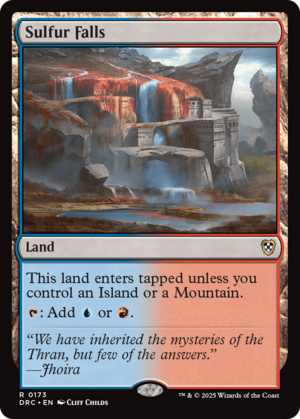
Card Details
Info
| Color: | |
| Identifies: | |
| Cost: | |
| Rarity: | Rare |
| Converted Cost: | 0 |
| Power/Toughness: | / |
| Types: | |
| SubTypes: | |
| Languages: | 
          |
| Layout: | Normal |
| Rank: | |
| Saltiness: |
Rules
Text
This land enters tapped unless you control an Island or a Mountain.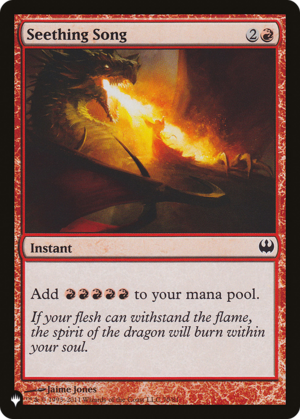
Card Details
Info
| Color: | |
| Identifies: | |
| Cost: |
|
| Rarity: | Common |
| Converted Cost: | 3 |
| Power/Toughness: | / |
| Types: | |
| SubTypes: | |
| Languages: | 
         |
| Layout: | Normal |
| Rank: | |
| Saltiness: |
Rules
Prices
Legalities
Standard
Standardbrawl
Vintage
Modern
Brawl
Historic
Duel
Alchemy
Predh
Oathbreaker
Commander
Pioneer
Oldschool
Timeless
Premodern
Penny
Pauper
Gladiator
Paupercommander
Future
Legacy
Text
Add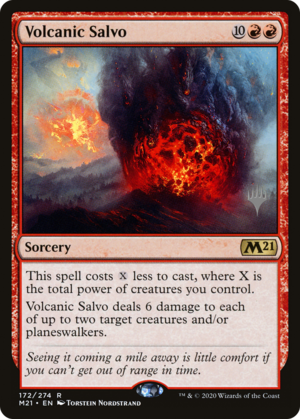
Card Details
Info
| Color: | |
| Identifies: | |
| Cost: |
|
| Rarity: | Rare |
| Converted Cost: | 12 |
| Power/Toughness: | / |
| Types: | |
| SubTypes: | |
| Languages: | 
          |
| Layout: | Normal |
| Rank: | |
| Saltiness: |
Rules
Prices
Legalities
Standard
Standardbrawl
Vintage
Modern
Brawl
Historic
Duel
Alchemy
Predh
Oathbreaker
Commander
Pioneer
Oldschool
Timeless
Premodern
Penny
Pauper
Gladiator
Paupercommander
Future
Legacy
Text
This spell costs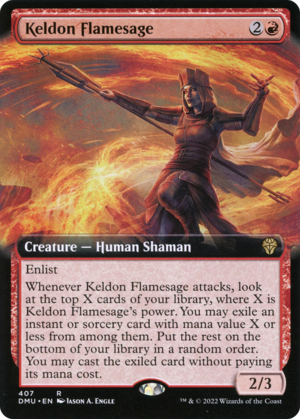
Card Details
Info
| Color: | |
| Identifies: | |
| Cost: |
|
| Rarity: | Rare |
| Converted Cost: | 3 |
| Power/Toughness: | 2/3 |
| Types: | |
| SubTypes: | |
| Languages: | 
       |
| Layout: | Normal |
| Rank: | |
| Saltiness: |
Abilities/Keywords
Rules
Prices
Legalities
Standard
Standardbrawl
Vintage
Modern
Brawl
Historic
Duel
Alchemy
Predh
Oathbreaker
Commander
Pioneer
Oldschool
Timeless
Premodern
Penny
Pauper
Gladiator
Paupercommander
Future
Legacy